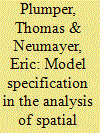| Srl | Item |
| 1 |
ID:
193259


|
|
|
|
|
| Summary/Abstract |
This study examines the nexus between governance and human development in Africa. It uses data for the period 2010–2019 and takes into account the existence of spatial dependence and controls for the endogeneity problem through a Generalized Spatial Two Stage Least Squares (2SLS) technique. The exploratory spatial data analysis reveals the existence of spatial dependence on human development and governance quality. Our empirical findings support that in Africa, “good fences make good neighbors,” or proximity matters in the distribution of human development. Implications are discussed. This study complements the extant literature by using more updated data and employing an alternative and more robust estimation approach.
|
|
|
|
|
|
|
|
|
|
|
|
|
|
|
|
| 2 |
ID:
094983


|
|
|
|
|
| Publication |
2010.
|
| Summary/Abstract |
The recent surge in studies analysing spatial dependence in political science has gone hand-in-hand with increased attention paid to the choice of estimation technique. In comparison, specification choice has been relatively neglected, even though it leads to equally, if not more, serious inference problems. In this article four specification issues are analysed. It is argued that to avoid biased estimates of the spatial effects, researchers need to consider carefully how to model temporal dynamics, common trends and common shocks, as well as how to account for spatial clustering and unobserved spatial heterogeneity. The remaining two specification issues relate to the weighting matrix employed for the creation of spatial effects: whether it should be row-standardised and what functional form to choose for this matrix. The importance of these specification issues is demonstrated by replicating Hays' model of spatial dependence in international capital tax rate competition. Seemingly small changes to model specification have major impacts on the spatial effect estimates. It is recommended that spatial analysts develop their theories of spatial dependencies further to provide more guidance on the specification of the estimation model. In the absence of sufficiently developed theories, the robustness of results to specification changes needs to be demonstrated.
|
|
|
|
|
|
|
|
|
|
|
|
|
|
|
|
| 3 |
ID:
189453


|
|
|
|
|
| Summary/Abstract |
This paper studies the determinants of terrorism at the sub-national level in Colombia during 2001–2014. In order to establish robust relationships, a Bayesian model averaging framework has been implemented using departmental data. We find that the violence suffered by this country is linked to economic factors, especially labor market outcomes. The results obtained are not significantly altered by the use of relative measures of terror, the specification of alternative parameters and model priors or the presence of spatial dependence. The main conclusion drawn from our analysis is that an appropriate strategy to fight against terrorism in similar contexts is to increase its opportunity cost. This might be achieved through the promotion of inclusive socioeconomic development, primarily in rural areas.
|
|
|
|
|
|
|
|
|
|
|
|
|
|
|
|